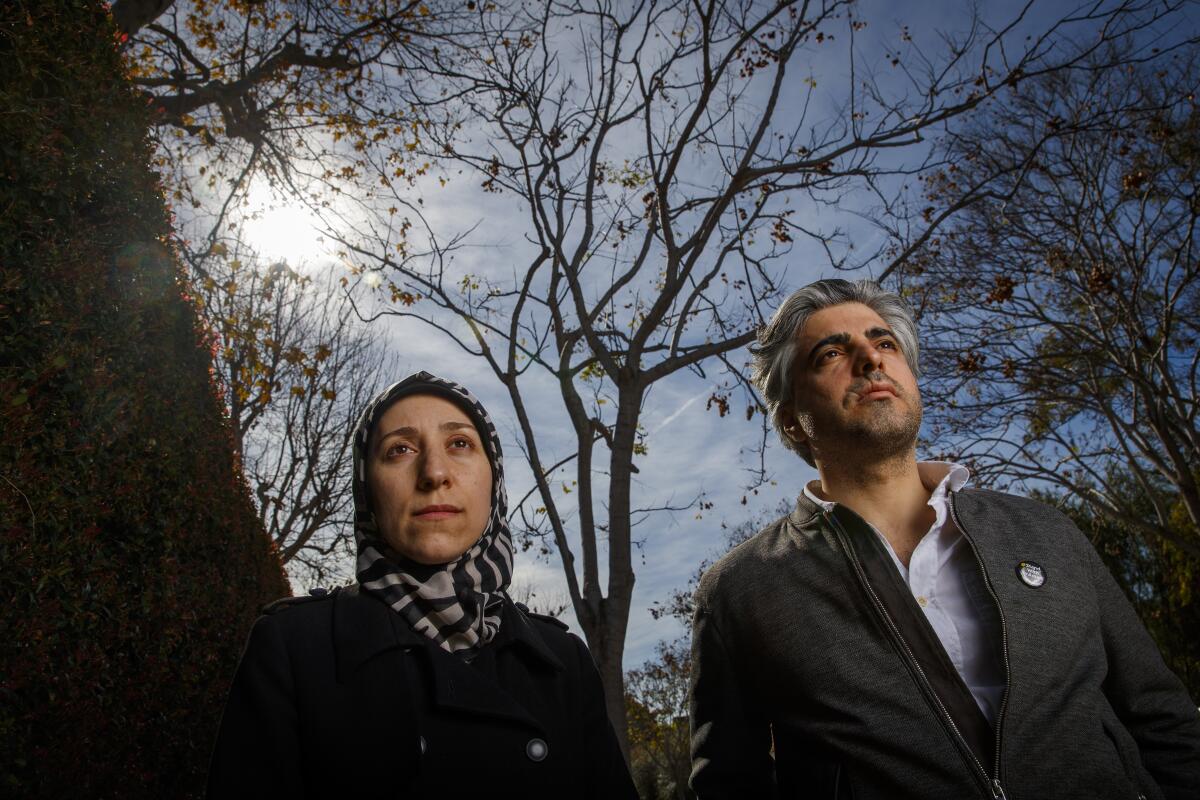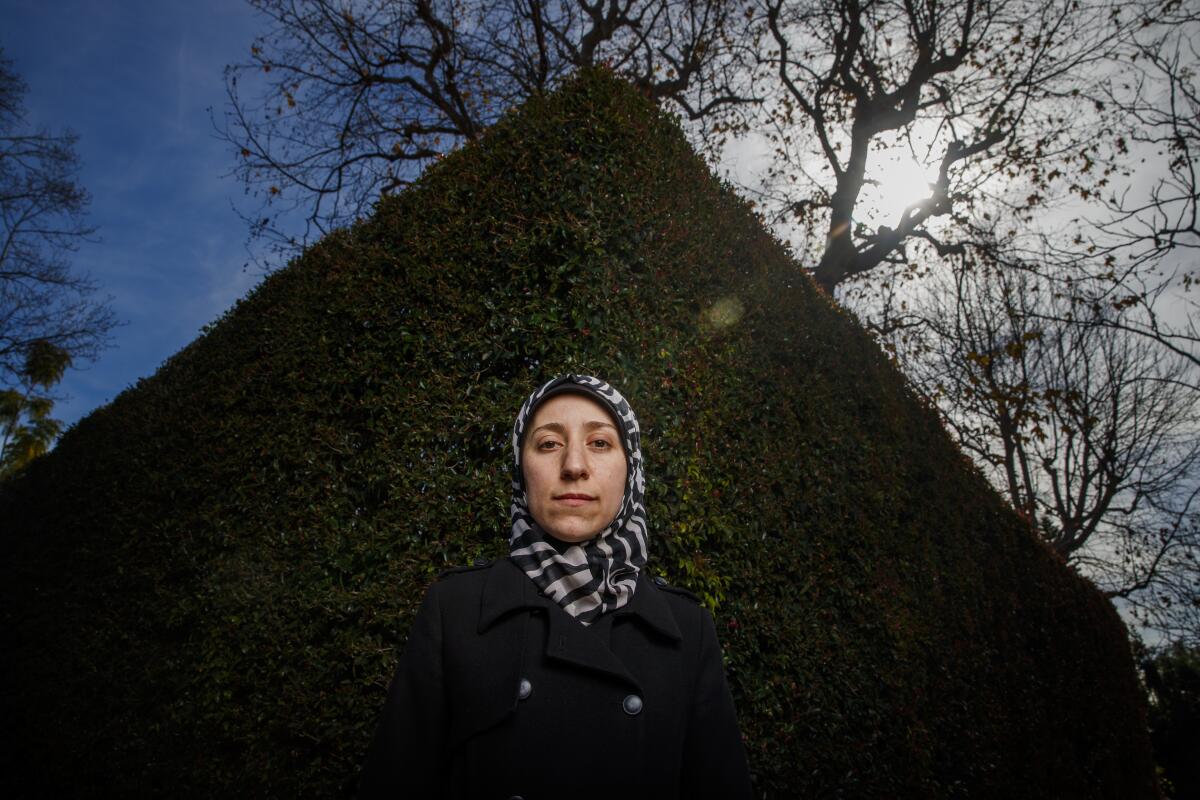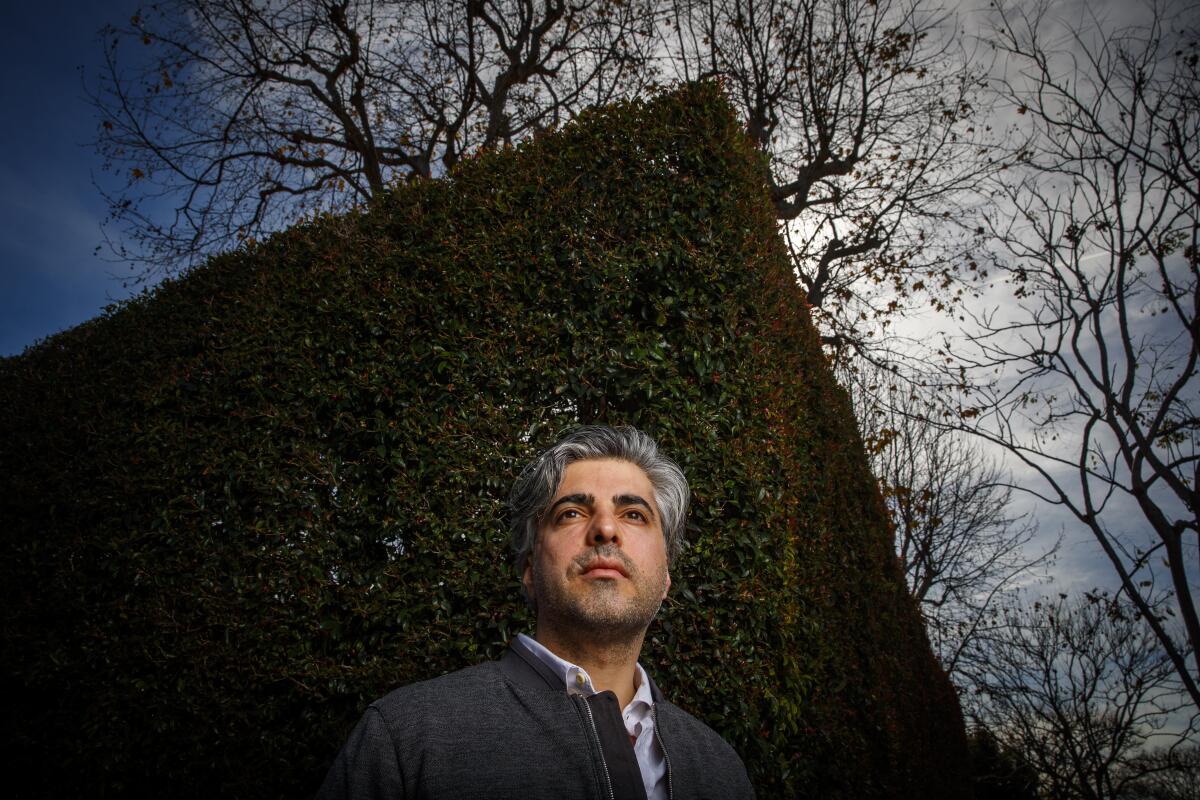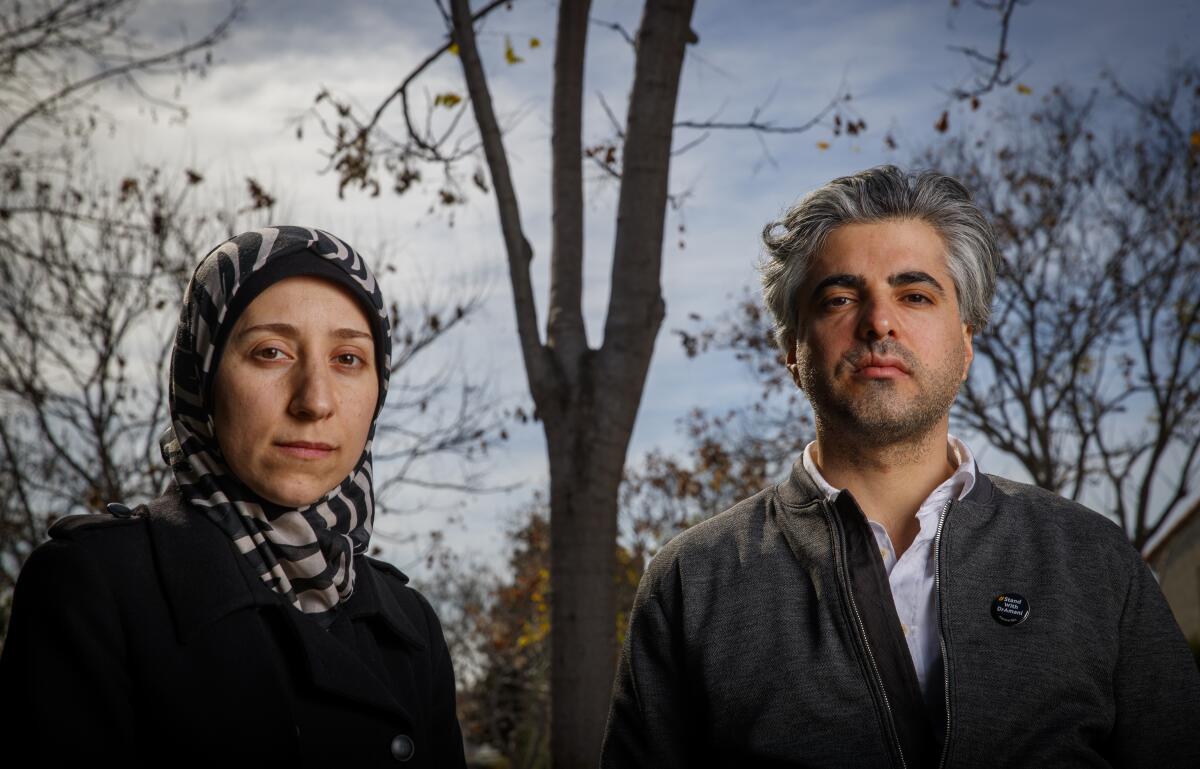Feras Fayyad almost couldn’t visit the U.S. because he’s Syrian. Now he’s going to the Oscars

- Share via
“Did you know this is the ‘Pretty Woman’ hotel?” a publicist asked Dr. Amani Ballour.
The Syrian pediatrician shook her head quietly and told the handler she had never seen the romantic comedy. She took a seat at a table and glanced around the Beverly Wilshire, its large windows overlooking Rodeo Drive. Her face was blank.
Just two years ago, Ballour was celebrating her 30th birthday in the subterranean hospital she oversaw on the outskirts of Damascus. Deemed “The Cave,” the clinic was established to treat civilians harmed during the Syrian war, which began in 2011 with demonstrations calling for President Bashar Assad’s ouster. Every day, Ballour faced horror: Babies suffocating from chlorine chemical attacks, patients lying on the floor in pools of blood, constant wall-shaking from the bombing overhead.
So for her birthday, her colleagues tried to distract her, using blown-up latex gloves as balloons and making popcorn as a treat. And now, here she was, less than a week from walking the red carpet at the Oscars because a film about her work is nominated in the documentary feature category.
There are, in fact, two nonfiction features focusing on the bombing of Syrian hospitals nominated for Academy Awards this year: “The Cave,” directed by Feras Fayyad, and “For Sama,” from Waad al-Kateab.
“We know Syria is a small country, and to have two films in the Oscars, I think that will help people believe the truth,” said Ballour, now 32. “This is very important, because too many people around the world don’t know what happens in Syria. I hope two films will make pressure to stop bombing hospitals.”

It was not easy for Ballour and her film’s director to attend the Hollywood ceremony. Fayyad, who lives in exile in Copenhagen, was denied permission by the U.S. Embassy to enter the country in December due to President Trump’s travel ban. After National Geographic, which produced “The Cave,” lobbied on his behalf, he was granted a two-month visa on Jan. 24. The filmmaker, 35, faced similar tumult in 2018, when he was allowed to attend the Oscars at the very last minute — one day before the telecast — on behalf of his nominated documentary “Last Men in Aleppo.”
“The thing is, I feel survivor guilt,” said Fayyad, sitting behind his movie’s subject. “And it’s not just because I’m a Syrian survivor, while our relatives suffer from hunger and economic collapse from the war and the daily bombing. I have double survivor guilt because I’m here, and there are people who have the same issues every time that they want to get here. It’s problematic how many people face the same issue and nobody will hear their voices.”
Ballour — who has lived in Turkey since 2018 — is here on a two-week visa as a result of invitations from National Geographic and the Syrian American Medical Society. She said that when she applied for the document, she was told “because you are Syrian, we should deny your visa, but because you have invitations, we will see.”
“It’s frustrating when they say that to me,” she said, her face growing somber. “What does it mean to be Syrian? It wasn’t our choice to leave. We wanted to stay in our country. They make you feel that you are something bad when they say they don’t want you to come.”
While Fayyad said he was “over the moon” that he and Ballour finally secured temporary admission to the States, he is also dismayed at how the long wait affected his ability to promote “The Cave.” Because he arrived here less than a week before Oscar voting closed, he feels his ability to talk about his film with his fellow academy members was undermined.
“I was so exhausted when I got here. I couldn’t do anything, because really, my body is destroyed,” he said. “All the energy I have to put in the film — it’s been taken out of my body. It’s hard to do anything, and the time is what’s short.”
But Fayyad has known far greater struggles. In March 2011, days after the start of the revolution, he was kidnapped in front of his flat and thrown into prison. His arrest came as a result of training others how to use cameras to document police brutality, he said. He spent 18 months being tortured alongside other filmmakers, journalists and doctors.
“The moment they capture you, they keep beating you, so you could arrive dying at the prison,” said Fayyad, who bears scars on his lips. “They beat me in my face, used electricity on my neck, razors on my neck. They throw you in the corridor and everyone comes and beats and slaps you. This was every day. I don’t know how I survived.”
It is this experience that has fueled Fayyad to tell the stories of his people. With “The Cave,” the director was physically unable to get to the hospital where Ballour worked because Ghouta, the suburb where it was located, was under siege. So he tracked down three local cinematographers willing to document daily life in the underground space. The team communicated with Fayyad at least twice daily, going over footage they’d upload in small files over the hospital’s internet.

There have been 588 attacks on 350 Syrian health facilities from March 2011 through November 2019, according to Physicians for Human Rights, an aid group that gathers information about the country’s medical workers. During that period, the group reported, 914 medical personnel were killed.
“They do it because when they bomb everywhere, all the people go to the hospitals, and if they destroy all the hospitals, can you imagine what people will feel?” Ballour said. “They want people to give up, to lose hope, to come back under the control of the Assad family.”
Ballour began working at the Cave in 2013, shortly after completing general medical studies at the University of Damascus. She was in the midst of her pediatric residency when the war began but abandoned her studies to focus on the hidden hospital. She became resolute about the work when, early in the war, she saw a child who had been shot in the head while passing a local political demonstration.
“If I can help, of course, I will help,” she said, matter-of-factly. “There’s nothing to think about. I’m a doctor because I wanted to help people. A lot of doctors fled, and I don’t understand that. They studied medicine to help people when they needed it. I understand they have families. But these were innocent civilians.”
Initially, Fayyad said, he planned to train his lens on seven hospitals. But when he heard about Ballour, he was drawn to the idea of highlighting a woman working in what is considered to be a man’s field in Syria. Growing up with his mother, seven sisters and four aunts, the director said he was part of a generation that believes both genders are equal.
But in “The Cave,” Ballour faces distrust and condescension from male patients who tell her that “women should stay at home, not work.”
“No one can tell me not to work,” she replies angrily. “No one can tell me what to do!”
In the film, Ballour is often depicted this way — as a defiant force of steely ambition. While treating one girl, she urges the child to think about what she wants to be when she grows up — perhaps a doctor or a lawyer — because “we live so we can be something important. We don’t want to be just ordinary.”
But she is also calm and compassionate, stroking the bloodied heads of crying children, rubbing the backs of infants after dislodging debris from their airways.
“Is God really watching?” she wonders aloud in one scene, taking in the destruction.
“Of course, I’ll never forget what I saw,” Ballour acknowledged. “We were all the time angry and sad and afraid of bombing. And I was hungry, like the children. Of course, I can’t forget the child who says to me ‘I’m hungry.’ Or the child who says to me ‘Why you cut my hand?’ He was 5 years old and lost his hand by bombing. ‘Doctor, why you cut my hand?’ There is no answer for their questions, but of course I remember them.”
Ballour has stopped working as a doctor since she was forced out of Syria in 2018. She has applied for asylum to Canada, and if her application is granted, she would like to study radiology. But her main goal, she said, is to support Syrian women: “My studying can wait. The situation now is urgent.”

“I am here to be the voice for Syrian people,” said Ballour, who said she has not even considered what she will wear to the Oscars. “I want to tell all the people about their suffering and their struggle to get rights, freedom, dignity. We want to live in a democratic country, like others. I hope we can put pressure on politicians and the international community to help them.”
As for Fayyad, he is focusing on his third documentary, which will be about a group of lawyers fighting for the rule of law in Syria. He feels it is his duty to continue telling stories about his country because he was almost silenced there.
“I managed to survive and I keep telling this story,” he said. “If we weren’t important, they wouldn’t arrest us. If our voice wasn’t strong, they wouldn’t attack us. If I didn’t tell this story, I feel like I wouldn’t be fulfilling my responsibility. In my mind, there is a small light. Every time I feel that I’ve lost something, the light turns on and tells me I have to keep going because there is a prisoner screaming inside of me, and I have to bring his voice out.”
More to Read
Only good movies
Get the Indie Focus newsletter, Mark Olsen's weekly guide to the world of cinema.
You may occasionally receive promotional content from the Los Angeles Times.












